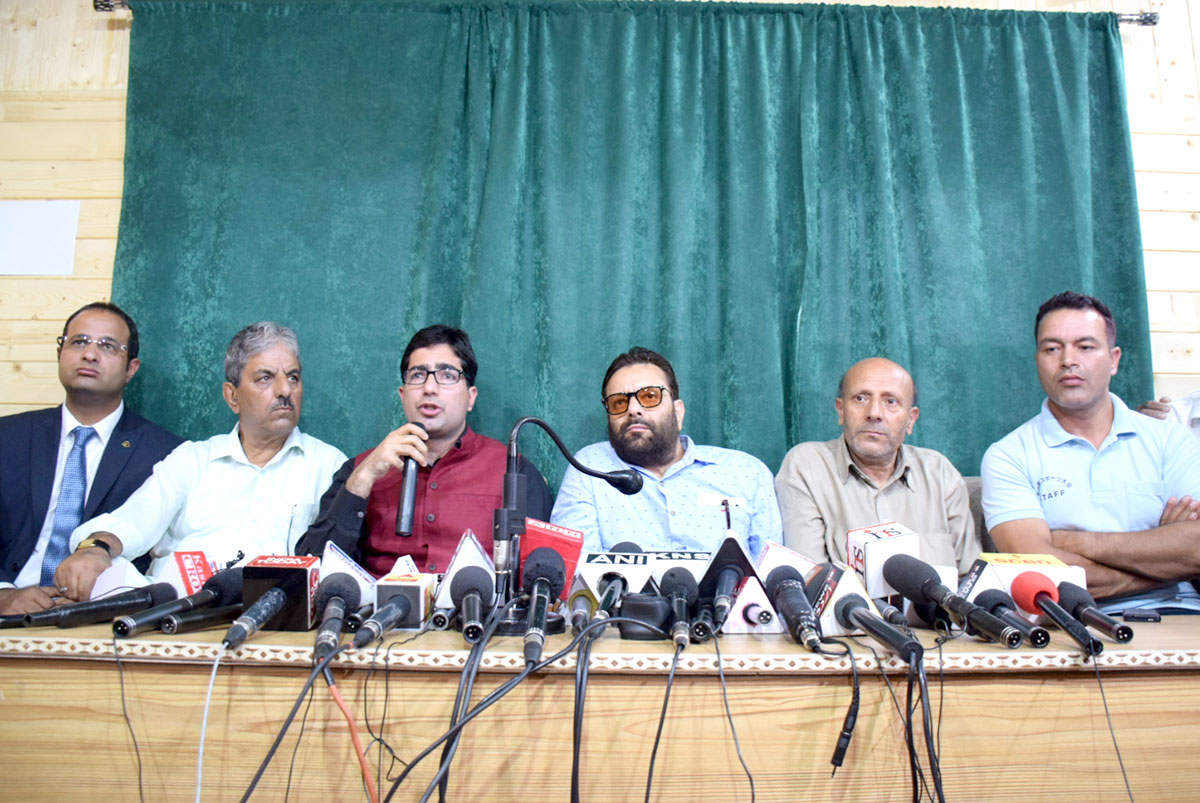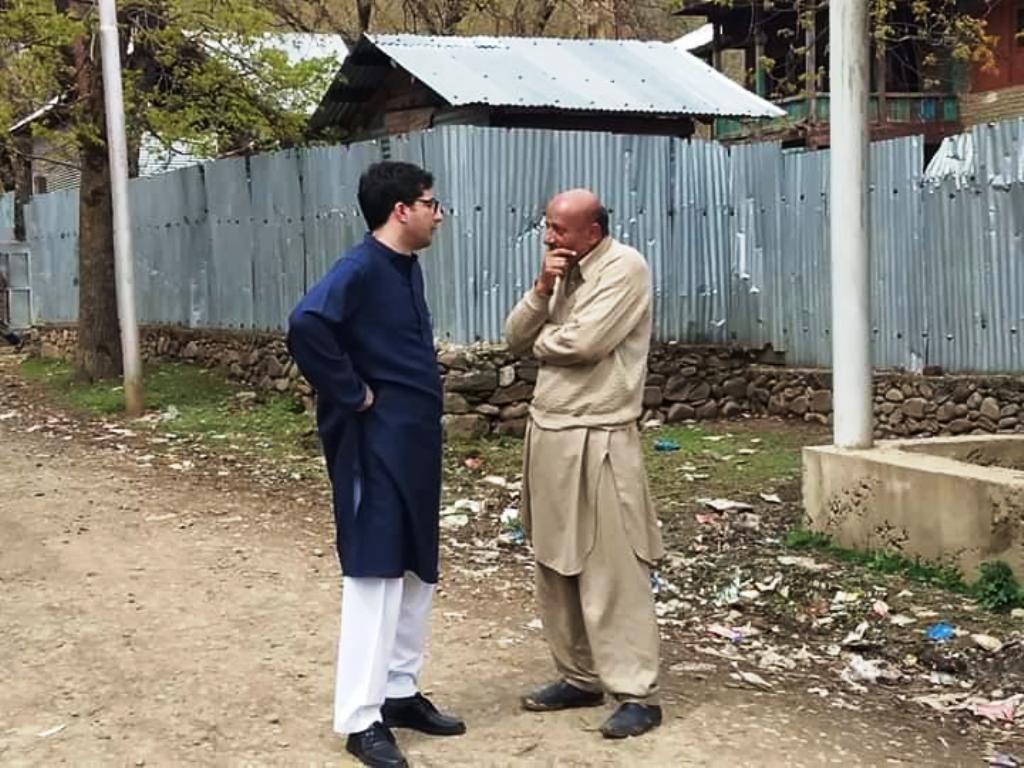The joining of hands between two former state government officers, engineer Rasheed and Shah Feasal, is the beginning of the tectonic shift and realignment of political forces in Kashmir, ahead of an elusive assembly election, reports Tasavur Mushtaq

Spring of 2008, a person from the small hamlet of Mawar (Langate) had surprised his ilk in his village. An engineer with decent earning decided to quit his job. Surprisingly, he jumped into the electoral fray. With less than three weeks to the state assembly elections, he, against the wishes of his family and friends, started campaigning for his candidature. Fighting against the political bigwigs, his identity was his machinery. As the results were declared, this man stunned the political pundits as he defeated NC stalwart Sharif Din Shariq.
More than a decade later, Sheikh Abdul Rasheed, aka Engineer Rasheed, is a two-time MLA and heads his Awami Itehaad Party (AIP).
When Rasheed was out to fight politically, a doctor deep down in Sogam, in the Lolab Valley – in whose praise Allama Iqbal has sung – was aspiring to be an administrator. Fighting to prove his mettle at the national level, the young man was surprised to see himself as the first-ever Kashmiri to top the Union Public Service Commission 2009 examination. The boy from a remote village who made Kashmir proud was 27-year-old Shah Faesal. He joined the services and held important positions.
But in 2018 fall, Faesal, the Managing Director JKPDC, a Rs 500 crore wholly owned company of the state government, stunned one and all. He repeated Rasheed of 2008 in a bigger way, resigned from the coveted services and decided to plunge into politics. Days later, he floated his Jammu & Kashmir People’s Movement (JKPM).
Sharing Similarities
Two professionals, Rasheed and Faesal from the frontier Kupwara share many similarities. Being non-conventional in their politics, both have endured the pain dearly.
Born in 1967, 52-year-old Rasheed comes from a humble background. Son of a retired school teacher, Khazir Muhammad Sheikh, Rasheed qualified his tenth class in 1983 and later joined government polytechnic college for three-year engineering diploma. In September 1993, he was appointed as assistant manager (equivalent to junior engineer) in J&K Projects Construction Corporation (JKPCC), a state-owned public construction corporation. In between, the man from Mawar witnessed the worst. Reportedly, he was subjected to 400 days of army’s bonded labour—the modern-day begear. The army, he said, would force him and others to clean and fill their vehicles with petrol. Besides, he had to bear the brunt when the army would frequently turn his residence into a makeshift outpost by locking down his whole family inside one room. In summer 1995, Rasheed said he was hospitalized for three weeks in Srinagar’s Bone and Joint hospital after he refused to give cement from the site of an under-construction bridge to some unidentified gunmen.
Officially too, Rasheed had to face the music. Engaged in his social engagements during his active service, he faced five suspensions and his salary was withheld many times. At home, his father was angry to see his son protesting against the army. He was shown door at least twice.
After being elected as the lawmaker, his confrontations continued assaults, both in and out of the state assembly.
Born in 1983, Faesal too had to struggle. Also a son of a government teacher, his father was killed by unidentified gunmen in 2002. Face to face with the death, Faesal appeared in Common Entrance Test on the fourth day of his father’s death. Motivated by his mother, also a government teacher, the eldest sibling in the family cleared the test to land in the medical college and later qualified IAS.
Serving the state at vital positions, Faesal had his own style. Followed widely on social media sites, he did not keep his word limited to the official assignments. Often in controversies, he was handed over show-cause notice from the central government’s department of personnel and training over a tweet commenting on a man raping his mother, “Patriarchy+Population+illiteracy+Alcohol=Rapistan!”. Sharing the show cause notice on his facebook, Faesal termed it as “love letter from the boss.” He further tweeted: “The irony here is that service rules with a colonial spirit are invoked in a democratic India to stifle the freedom of conscience. I’m sharing this to underscore the need for a rule change.”
As Rasheed quit his job while holding the position of a senior manager, Faesal too left it being in the powerful club of IAS. Apart from family background, geography, and the resignations, there is one more thing in common between the two – they use social media as part of their outreach.
Capturing Confidence
Out in the field with a Scorpio, three colleagues and a loudspeaker, Rasheed decided to fight parliamentary elections. A two-times-MLA, this was the first attempt for him to get into the Lok Sabha. With over three lakh followers on his facebook, Rasheed used his “common man” image, without security cover and campaigned across north Kashmir. He even carried his campaigning in the dead of night. Face to face with National Conference, Peoples Democratic Party and Peoples Conference, Rasheed singlehandedly managed his campaigns and asked for public donations. Using his specific style, Rasheed urged voters to do justice. “For NC, I am a sell-out; BJP says I belong to Pakistan; PDP labels me as the man of agencies; PC calls me a joker,” Rasheed said in Palhalan, the no-zone for mainstream politicians. A crowd-puller, connecting his heart to the homes of masses, Rasheed’s presence had its impact.
Acknowledging Rasheed as the “best choice in the present circumstances,” Shah Faesal on social media announced, “My vote is for him.”
On May 23, 2019, when the results were out, Rasheed emerged as the “man of the match”. Considered as “non-entity” by his rivals, he secured 1,01,500 votes and was leading in five out of 15 assembly seats in the north Kashmir which included Karnah, Langate, Uri, Baramulla and Tangmarg. He ended runner up in four segments.
Preparing For Polls
In a run-up to eluding assembly elections, the two unconventional politicians and new stakeholders have joined their hands and gave birth to People’s United Front (PUF), a name sounding like erstwhile MUF (Muslim United Front).
Addressing media jointly at Srinagar’s Aiwan-e-Suhafat on June 18, the two north Kashmir politicians announced their alliance and insisted they are for people and not for rehabilitation. They said they will be tackling seriously and sincerely both the issue of Kashmir and the issues of Kashmir.
“Ours is an agenda of hope and we will not let people down,” Rasheed said. “Right now, we feel really let down for the lack of credible leadership.”
The alliance announcement was made by Javed Mustafa Mir, a four-time lawmaker from Chadoora. Mir, who is chairman of JKPM, will head the alliance’s 3-member coordination committee.
Feasal said the Front is all-inclusive alliance and will provide justice and opportunities to all. He said the history will take note of the fact that when the state was fighting its existential battle, there were some people who avoided staying divided and joined hands together. He said the Front is just the beginning of the start.
“We are not here for rehabilitation but both of us have sacrificed something to serve the people,” Rasheed said. “I was an engineer and I gave up the job to serve people and Shah Feasal was IAS topper who resigned after 10 years to serve the people.”

Expressing confidence, Rasheed said the people must stay assured that PUF will form the next government. “We have come to serve people after sacrificing something,” Rasheed insisted. “I assure people we will give them corruption and nepotism-free government which is credible, that will do everything for a political resolution of Kashmir and the talks with Pakistan.” He talked about two slogans as well, “Jammu Kashmir Ki Mujboori Hai – PUF Zaroori Hai.” The other was: “Takht Badal Dou, Taj Badl Dou – Beaimanoun Ka Raaj Badal Dou.”
The Common Minimum Programme (CMP) which holds the base of the alliance is based on 45 points.
Rivals Reveal
Omar Abdullah, vice-president of NC, state’s oldest political party accused Delhi of “creating” new political parties in Kashmir to “suppress” the voice of the people and questioned why such formations were not launched from Jammu or Ladakh regions.
“Contesting elections or floating your own political party is part of democracy and I don’t have any issues with that,” Omar was quoted saying a party convention. “But why is it that these political parties are launched only in Kashmir; why not from Jammu or Ladakh? Doesn’t it clearly indicate a ploy aimed at dividing us further?”
Post PUF launch, influential Shia cleric and Peoples Conference leader, Imran Ansari dubbed it as “Sadhbavna Alliance.” He tweeted: “The Sadhbhavana Alliance in making. Interesting.” This alliance is seen to be upsetting the political fortunes from north Kashmir and, most possibly, Lone’s party may face more than NC and PDP.
Reports from ground zero suggest that the political forces would be regrouping in Kashmir and the process will start from north Kashmir. These realignments are normal before every assembly election in the state, but in Kashmir, these shifts will be felt quite seriously in the coming days.
But the larger crisis that the political class in Kashmir is facing is if at all the elections are taking place. Though a majority of them foresee polls in 2019 autumn, there are pessimists who see it happening after 2020 yatra!















